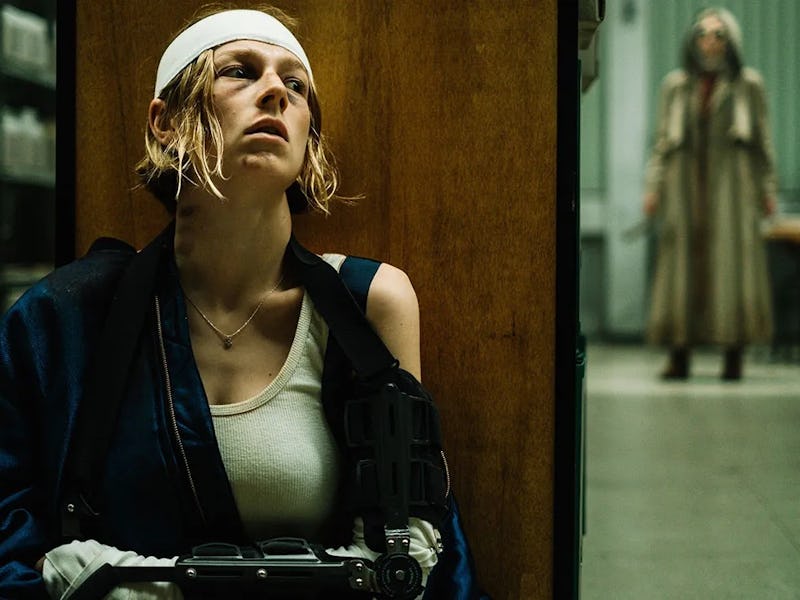Cuckoo Is Maddeningly Close to Being a Great Surreal Horror Movie
Tilman Singer’s follow-up to his superb demonic debut is a mixed bag.

As a fan of Tilman Singer’s one-of-a-kind debut Luz, I expected something surreal and bizarre from Cuckoo. The title all but confirms madness will ensue, which is par for Singer’s course. Unfortunately, the filmmaker’s uncontainable ideals are less accessible in Cuckoo. Singer welcomes audiences into an uncanny thriller where “Cuckoo” holds a double meaning, and genre elements revel in their absurdities, but the clashing tonalities of his sophomore film’s B-movie leanings uncomfortably collide against an otherwise severe approach. Luz ultimately works because there are minimal overcomplications, but Cuckoo wavers between nuttiness and arthouse rigidity.
Hunter Schafer stars as the 17-year-old American transplant Gretchen, whose family has just relocated to a resort in the Bavarian Alps. Her father Luis (Marton Csokas), stepmother Beth (Jessica Henwick), and mute 7-year-old stepsister Alma (Mila Lieu) are infinitely more excited about their uproot, especially Luis and Beth, both hired to renovate on location. The resort’s figurehead, Mr. König (Dan Stevens), greets everyone with a thick “Guten Tag” — a caricature of national stereotypes flying considerable red flags. Gretchen’s teenage angst begets prickly agitation, but quickly pivots to heightened suspicion when women on the premises display abnormal behaviors in the entrance lobby. Something isn’t quite right, and that’s when Gretchen sees it — a red-eyed creature sprinting behind as she speedily peddles her bike toward home one night.
All the pieces are in place to anoint a new weirdo midnighter delight that pushes horror boundaries. Dan Stevens gets to play a mad-scientist-adjacent li’l’ freak with undisclosed motives and a slick lower-tier Bond villain’s charisma. Creature designs blend birdlike attributes like beady blood-red eyes with almost a zombie-like figure. Films like Gore Verbinski’s A Cure for Wellness or Alex van Warmerdam’s Borgman become visual comparison points as Gretchen’s reality distorts into something picturesque yet delirious. Singer’s plenty ambitious as Gretchen becomes a target for odd happenings that all point back to Herr König, but exactly what’s going on becomes a jumbled puzzle.
There’s a matriarchal and reproductive angle to the film’s mystery that is verbally confirmed through dialogue, tying into the snarling entity that can emit a magical screech that generates miniature time loops for anyone in earshot. Are you starting to scratch your head? That’s intended. Singer’s brand of fearless batshittery is what makes his creative voice so unique and utterly welcome, yet in taking such boldly bananas risks, he loses control of Cuckoo’s storytelling. In striving to deliver something unlike you’ve ever seen — which is accomplished — disturbing imagery rides bumper cars with plot momentum as both jockey for position while bouncing the other off course. There’s so much to love about Stevens’ untrustworthy Pied Piper (wind instrument included), goopy practical effects, and destabilizing sound design as special abilities stop characters dead in their tracks. The problem is Singer’s inability to keep the film’s energies as high when grounded dread plummets back to Earth in the next scene.
Cuckoo is effectively creepy when Gretchen encounters danger, as Singer toys with blackout backgrounds that conceal nightmarish threats. Schafer is a capable lead who comically calls out how brazenly strange her family’s lives have become since their Alps transition. She also keenly conveys desperate fearfulness when confronting the film’s monstrous midnight predator. Singer’s outstanding atmospheric approach to horror shines brightest in Cuckoo, as he uses cinematography as a weapon. Gretchen’s pursuer, credited as The Hooded Woman (Kalin Morrow), strikes fear whether dashing between background trees or transporting into a close-up as composer Simon Waskow spikes the score. There’s an icky and unsettling experimentation angle that parallels societal horrors where women are stripped of their bodily autonomy, as well as visual frights where The Hooded Woman becomes a feral bloodhound and chases targets for frantic thrills. Psychological and physical horrors meld into a unified, if maybe sometimes senseless, attack on our senses, as the storytelling advances.
Singer’s freakishly fascinating tale is a better highlight reel than sustainable journey, as the film’s structure sometimes dissipates. Characters like Gretchen’s outsider crush, Ed (Astrid Bergès-Frisbey), seem only to serve a selective purpose and are stashed away until absolutely necessary. The introduction of investigator Henry (Jan Bluthardt) adds a dramatic procedural element that irritatingly rubs against König’s absurd secret mission. Singer loves embracing the unreality of his narratives, but Cuckoo makes that difficult because there needs to be more explanation than in, say, his previous demonic fever dream that swan dives off a creative cliff and gracefully free-falls. Stevens’ despicable line deliveries about cuckoo bird hatchlings or how to breed superiority aren’t as powerfully deranged as they should be, nor does he achieve levels of eccentrics the role of König deserves. Cuckoo should not feel restrained nor subdued, yet here we are.
While my response to Singer’s latest is mixed, my closing takeaway skews more positive: I’ll always be in line for a Tilman Singer release. Luz and Cuckoo are equally divisive, deliciously madcap, and deeply unapologetic. Singer has a long career of mystifying audiences ahead, even if his latest can’t quite balance sincerity with insanity. At least he’s trying something fresh, meant to be loved or hated. Cuckoo might fly the coop on Singer, but it’s still worth the gamble for anyone who loves surrealist expressionist horror films.